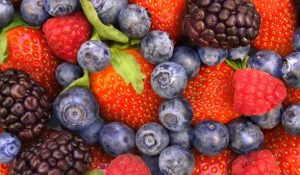
All fruit is not created equal. Explain how certain fruit (give examples) are high in sugar and carbs and perhaps not as high in vitamins and minerals.
Darker fruits like berries contain less sugar per serving then lighter colored fruits such as bananas and melons. As a whole, most fruits that are dark in color are the most rich in antioxidants, like dark skinned grapes, and berries.
What fruits are the “best”? Which are perhaps better to pass, or eat in moderation? Please explain why.
Berries are the best due to low sugar content, and bananas and melons should be eaten in moderation because they are higher in sugar and not as high in fiber.
On some diets, they say you can eat unlimited amounts of fruits and vegetables. While veggies tend to be lower in carbs/sugar, this isn’t necessarily the case in fruit. Why can people not eat unlimited fruit?
Fruit has natural sugars in it but it can still spike glucose levels, resulting in the metabolism having to process excess sugar and this is not optimal for those wanting to burn body fat. That being said replacing cookies and other processed flours and pastries with fruit is a great start to a healthy lifestyle. Fruit is naturally lower in calories and higher in water and fiber, which will improve any lifestyle.
Talk about diabetics. What fruit should they avoid or limit? They should limit melons, and bananas. Aim for 15g or less of fruit carbohydrate per meal and snack.
Talk about what fruit does to your blood sugar levels. Fruit will no fiber like bananas, will cause a spike in blood sugar and when the blood sugar is spiked the body is no longer able to utilize the fat metabolism mechanism, putting the body at a sub optimal metabolic state.
How much is too much? If you’re trying to lose weight, how much fruit should you be eating a day? I like to suggest 9-11 servings of fruits and vegetables daily, with a ratio of 1:3 fruit: vegetables.
Talk portion size. It’s hard to know how carbs/sugar/calories are, since whole fruit sizes vary. Does it make a big difference if you’re eating a big banana/apple/pear/orange? Yes, fruits that tend to be large like bananas and grapefruit, oranges, etc. count as 2 servings while a clementine, plum or small apple count as 1 serving.
Does time of day matter? Does fruit spike your blood sugar levels more so in the morning or at night? Does it make you hungrier before bed? Everyone is different, I would suggest to focus on keeping fruit portions moderate and choosing the low sugar fruits like berries rather than aiming to eat at a certain time of day.
Is it better to eat fruit in combination with something (in a salad with protein and fat) or stand alone? Please explain. Food pairing is common on many diets, research suggest that fruit and vegetables are digested best by themselves. Again, “diet rules” are not lifestyle changes, if a handful of nuts or a smear of almond butter make a serving of fruit or vegetables more appealing and satisfying then incorporate them into meals/snacks.
Please talk about these fruits specifically: what are the good and bad attributes:
Apples are rich in insoluble fiber, which helps with heart disease prevention
Oranges are rich in vitamin C which boost the immune system.
Pears are also rich in fiber which is heart healthy and will keep you feeling full for longer, resulting in better portion control.
Strawberries are an excellent source of antioxidant-promoting vitamin C and manganese. They are also a very good source of dietary fiber, iodine, and folate.
Watermelons are about 92 is percent water, which is great for hydrating on a hot day. It has significant levels of vitamins A, B6 and C, lots of lycopene, antioxidants and amino acids.

